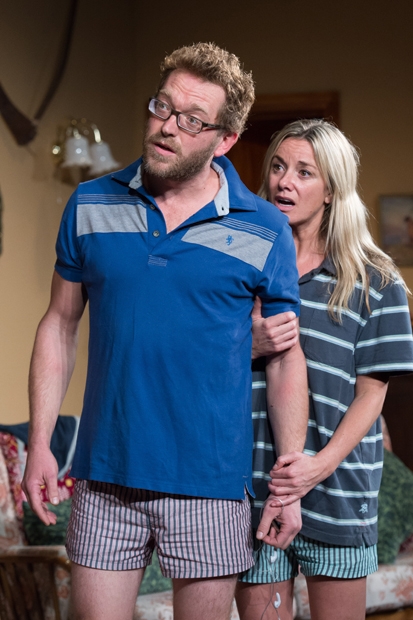This is a strange one. Simon Paisley Day’s new play feels like a conventional comedy of manners. Three couples pitch up at a Welsh cottage for a relaxing weekend away from the kiddies. Trouble erupts instantly. Keith and Briony bicker over the milk that the swollen-breasted Briony has to express into plastic bottles. Keith secretly craves his wife’s ‘liquid love’ and he tiptoes around the cottage trying to glug it back without being spotted by the others.
Ross and Rosy arrive. They’re an achingly smug yuppie twosome. They finish each other’s sentences. They tee up each other’s anecdotes. They stand in the kitchen entwined in each other’s arms and gaze out at their friends like kittens on a Christmas card. They are, of course, keeping a stack of marital problems hidden from view.
Upper-class Charles and Serena got invited by accident. They’re loud, they’re rich, they’re armed and they’re hungry. Charles nips outside and bags a brace of partridge, which he dumps in the lap of vegetarian Briony. More madcap figures appear. A Welsh farmer stalks the cottage with a shotgun, convinced that the three English couples are about to start an orgy that will corrupt his only son. A drug-addled teenage sexpot arrives and after flashing her breasts at Ross she accuses him of molesting her.
The escalations of character and incident are handled with great assurance by Paisley Day, who happens to be a superb comic actor and who has evidently learned his craft from within. But what’s unusual here is that the play explicitly grades the three levels of our class system. Briony and Keith get zero points for being pea-brained, aitch-dropping estuarial numpties. Ross and Rosy are marked down for adopting crass bourgeois prejudices but they earn points for their attractive clothes, posh syntax and decent salaries. But it’s the toffs, Charles and Serena, who get full marks. Decent, optimistic, sensible and good fun, they’re the only fulfilled and carefree characters in the show.
If you want to make the most of modern Britain, this play argues, join the landed gentry. Simple as that. It’s a party political broadcast on behalf of the nobs and I have to say that its message was coolly received in some sections of the Hampstead Theatre, whose play-goers regard themselves as proud Milibandian class-liberators (from the comfort of their £2 million garden flats, of course). A pair of grouchy crab-apples next to me refused to applaud at the curtain call. More fool them. This is a breath of fresh air, a witty, light-hearted blast of mocking exuberance delivered with great style and bonhomie.
A terrific cast, too. Issy van Randwyck is crisply adorable as the no-nonsense Serena. Nicholas Rowe (looking like the prime minister’s leaner twin) is hilarious as an army veteran whose remedy for all spiritual ailments is to grab a gun, shoot an animal, and eat it. What a relief to see a bluff, good-natured satire that challenges the values of the Islington patisserie queue. (The Daily Mail gave it five stars.) And the direction, by Ed Hall, is spot-on. My only quibble? Not enough anti-Welsh gags. We’ve heard them all before, by the way, but keep trying.
‘Calm Down, Dear’ is the topical title of a feminist drama festival at Camden. To research her play, Pretty Ugly, Louise Orwin posted clips of herself on YouTube and invited the world’s charmers and gallants to judge her looks. ‘Go kill urself’ was a typical response. Ms Orwin, 26, wants to understand why insecure teens submit themselves to these online ordeals. But her method encourages heartless bozos to post unimaginative discourtesies over the internet. Many of these dimwitted loners will conclude that insulting women is normal, others that women long to be abused.
I’m happy to say that Ms Orwin herself is very fetching. She knows it too. And we know that she knows it because she invited everyone in the theatre to assess her looks in the middle of the show. Having settled the question of her desirability, she spent the rest of the play writhing on the floor, taking her clothes on and off and skipping. I suppose that prancing around in tight little schoolgirl’s outfits may just about qualify as ‘raising awareness’ of a ‘disturbing phenomenon’. Or perhaps it’s just a harmless piece of exhibitionism from a disaffected young beauty who seems to have erased pole-dancing from her list of career options only after an agonised period of self-enquiry.
Politically this play makes no sense. If Ms Orwin were to campaign against beauty contests she would organise one on a global scale and exclude every participant in the world, bar herself. That’s what this show amounts to. The Arts Council, which sponsors the production, has scored a direct hit on its credibility.







Comments